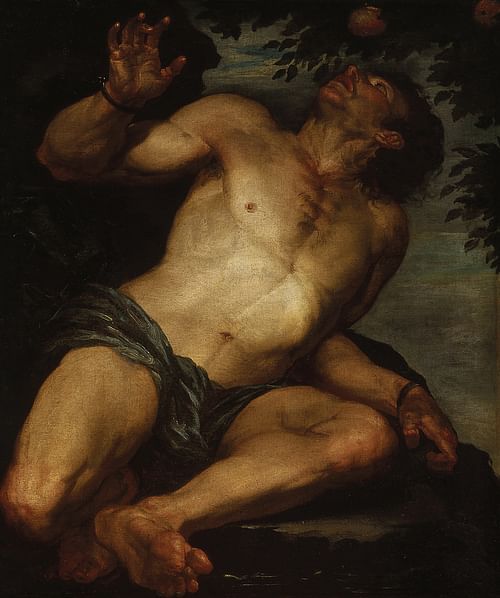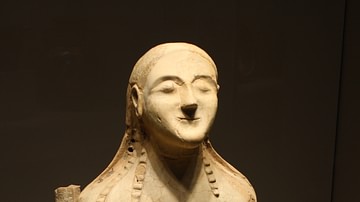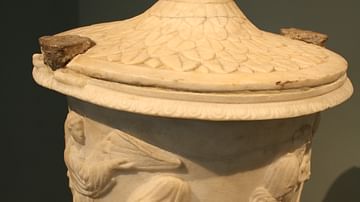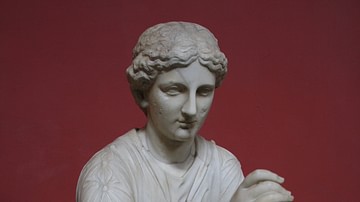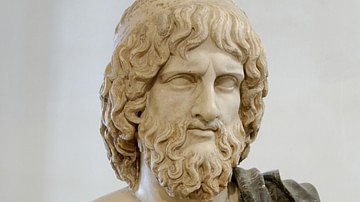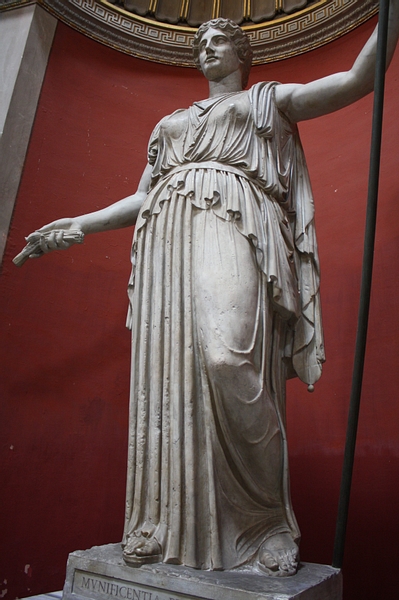
Ceres is the goddess of agriculture and the harvest in Roman mythology. Her favor would bring humankind plentiful harvests and fruitful crops, but her wrath brought blight, drought, and famine. Usually depicted as a matron, her symbols included the sickle, shafts of grain, and the cornucopia. Her Greek counterpart is Demeter, one of the 12 Olympian gods.
Family
Ceres was the daughter of Titans Saturn and Ops (Cronus and Rhea in Greek mythology) and the sister and consort of Jupiter. It was Jupiter who had defeated the Titans and forced Saturn, his father, to vomit up his sisters – Ceres, Vesta, and Juno – and brothers – Neptune and Pluto. With Neptune ruling the seas, Pluto governing the Underworld, and Vesta serving as the goddess of the hearth, Ceres became the goddess of agriculture.
Ceres had children with both gods and mortals. Her daughter Proserpina (Persephone in Greek mythology), the goddess of vegetation was fathered by Jupiter (Zeus). With Neptune, she had Despoena, the goddess of mysteries, and Arion, a divinely inspired horse with the power of speech. To escape Neptune's advances, Ceres had transformed herself into a mare, but he turned himself into a stallion and sired Arion. Lastly, Plutus, the blind and lame god of wealth, was the son of Ceres and the mortal Iasion.
Appearance & Attributes
Artistic depictions of the goddess are fairly consistent: a matronly woman often clad in flowing draperies crowned with wheat ears and bearing a shaft of grain with a sickle or cornucopia. E. M. Berens in his Mythology wrote that she is "represented as a woman of noble bearing and majestic appearance – tall, matronly and dignified ... sometimes she appears seated in a chariot drawn by winged dragons" (45). The Greek epic poet Homer (c. 750 BCE) called her Greek counterpart Demeter a sacred goddess and the "Bringer of Seasons, Bestower of Splendid Gifts" (11), while the Roman poet Ovid (43 BCE to 17 CE) wrote that "Ceres was the first to turn the glebe with the hooked plowshare; she kindness first gave corn and kindly sustenance to the world, she first gave laws. All things are the gift of Ceres" (93).
Pluto Kidnaps Proserpina
One sunny day Ceres' daughter Proserpina and her nymphs were gathering flowers on the slopes of the majestic Mount Aetna in Sicily. Their laughter caught the attention of Pluto, and one gaze at Proserpina and the god of the Underworld was smitten by her beauty – "… almost in one act did Pluto see and love and carry away so precipitate was his love" (Ovid, 95). He bade her to join him, but of course, like all the other goddesses he had asked, she refused. The Underworld was not the most appealing of places to live. Not taking her refusal well, he decided he only had one alternative: to kidnap her.
The nymphs tried unsuccessfully to protect Proserpina, but in a chariot drawn by four coal-black steeds, Pluto reached out, grabbed her, struck the earth with his two-pronged fork, opened up a crevice, and they descended into the realm of the Underworld. "Her captor sped his chariot and urged on his horse, calling each of them by name, and shaking the dark-dyed reins on their necks and manes." (95) Yet, before they plunged into the darkness, Proserpina had the mind to throw her girdle into the river Cyane, telling the nymphs to deliver it to her mother.
Later that night, when her daughter failed to return home, Ceres became worried and began to search franticly for Proserpina, ignoring her duties – "she reproached the lands, calling them ingrateful and unworthy of the gift of corn [grain] ... the fertility of this land, famous throughout the world lay false to its good name ..." (97) She wandered for nine days but found no one who could help. On the tenth day, she encountered the goddess Hecate, who said she had heard the cries of Proserpina but did not know who had taken her away. She suggested Ceres ask the all-seeing god of the sun Helios. She learned from Helios that her brother Jupiter had given Pluto permission to marry Proserpina and take her to Tartarus. Angry with Jupiter, Ceres abandoned Olympus and all heavenly food and chose to roam the earth disguised as an old woman.
Eleusis
One day in the town of Eleusis as she sat alone in tears, she drew the attention of the daughters of the king Celeus. Feeling sorry for the old woman, they asked their mother's permission to bring the old woman home. The queen, Metaneira, agreed, and they brought her to their palace where she was offered the position of nurse, carrying for their little brother Demophoon/Triptolemus. The little boy thrived under Ceres' care. Every night Ceres would feed the little boy nectar and place him in the fire with the intent of making him immortal and exempt from old age.
One night the queen saw her son in the flames, screamed, and grabbed him out of the flames only to find him unharmed. She turned to vent her outrage at the disguised Ceres, but she was gone. Incensed by the queen's attitude, Ceres had abandoned the form of the old woman and revealed herself to the queen. She told the queen who she was and her plans of immortality for her son, which were now impossible. A Homeric Hymn describes the scene in Greek tradition:
I am Demeter holder of honor who is for immortal and mortals alike the greatest boon and joy. ... let the people build a great shrine for me and an altar beneath it ... (Homer, 14)
The Return of Proserpina
Ceres left Eleusis and continued on her travels until she arrived in Sicily. Coming to the river Cyane, she discovered the girdle her daughter had left. Clutching the girdle to her chest, she heard the faint cries of the nymph Arethusa. The nymph informed her that in an attempt to escape the river god Alpheus, she had descended to the Underworld through a crevice. While there, she saw Proserpina sitting on a sable throne next to Pluto: "I saw Proserpina there with these two eyes. She seemed sad indeed and her face was still perturbed with fear" (Ovid, 97). Ceres decided that she had to confront Jupiter, but she was hesitant, realizing that Pluto would never relinquish her daughter. She withdrew in desperation.
Jupiter finally realized that with the famine continuing and the prayers of the people crying in hopelessness, he had to do something. He sent the gods to beseech Ceres to return to Olympus. When she finally returned, she told Jupiter, "If you have no regard for the mother, at least let the daughter touch her father's heart" (Ovid, 98). Consenting to let Proserpina be returned to her mother, Jupiter reminded her that Proserpina must not have eaten anything while in the Underworld or she cannot return to earth. Mercury was sent to Pluto to make a plea for Proserpina, and Pluto consented. However, a spirit named Ascalaphus reminded Jupiter had she eaten three pomegranate seeds while in the Underworld. In a compromise, Proserpina had to spend one month for each seed in Tartarus, or three months each year. Some sources, Ovid included, claim the compromise was for six months. During the time she is on earth, the harvests return and the trees and flowers bloom. While no children came from Proserpina's marriage to Pluto, one old myth has her as the mother of Dionysius-Zagreus, the Roman Bacchus.
Tantalus & Erysichthon
The kidnapping of her daughter revealed an emotional side to Ceres, but there are two short stories that reveal a darker side of the goddess. Tantalus was a cruel leader who had starved his people. He insulted the immortal gods by inviting them to dinner. He had killed and cooked his own son Pelops and served him to the gods. Suspecting something was amiss, the gods refused to eat except for Ceres, who still recovering from her ordeal, took one bit of his shoulder. The gods restored the boy to life, and Ceres replaced the shoulder with one of ivory. For punishment, the gods sent him to Tartarus where he stands in a stream of pure water but his thirst can never be quenched for the water recedes whenever he stoops to drink. Over his head hangs fresh fruit, but whenever he reaches for it, the branch wings upward. He is forever hungry and thirsty.
Erysichthon, on the other hand, made the mistake of cutting down Ceres' sacred trees, even when one of them bled. Angry at his insolence, Ceres gave him an insatiable hunger – no amount of food could dull the hunger pains. He lost everything he owned in order to buy food, but in the end, he devoured himself.
Worship & Legacy
There were a number of festivals and temples dedicated to Ceres in both Greece and Italy – the most notable being the Eleusinian Mysteries, celebrated in the fall, instituted by the goddess herself to honor both her daughter and herself. A second festival, the Lesser Mysteries, is celebrated in the spring. Other yearly festivals included the Thesmophoria and Cerealia.
The English word 'cereal' derives from the goddess' name. A dwarf planet in the asteroid belt between Mars and Jupiter, discovered by Giuseppe Piazzi in 1801, is also named in her honor.



